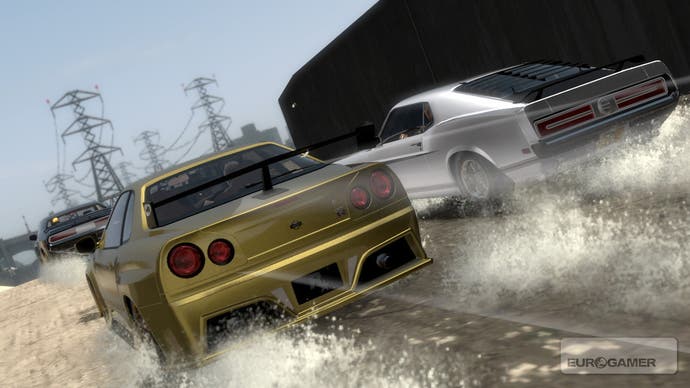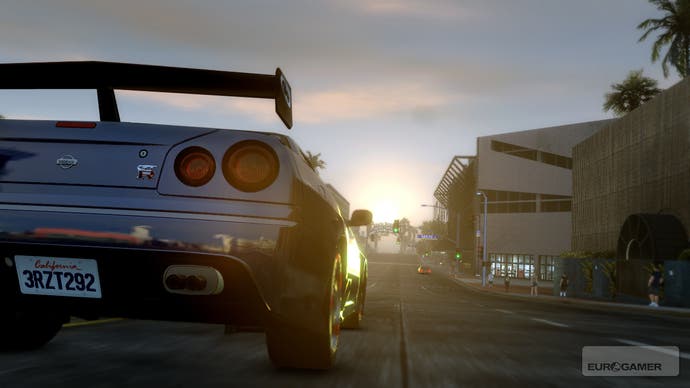Midnight Club: Los Angeles
City of angles.
In an attempt to offset this, Rockstar San Diego issues reputation points - experience, basically - for failure as well as victory, and there are numerous ways to obtain them: evading the cops (it's particularly enjoyable to pull over and then accelerate away as a cop gets out to walk to the driver-side window), racing opponents you encounter while cruising to the start of the race proper, and of course coming second, third, or anywhere in the field. It's hard not to approve of this, but it contradicts your instincts. Midnight Club: Los Angeles sets a blistering tempo, and when you come unstuck, even late on, you just want to begin again and get it right.
Building up rep and winnings from races also allows you to buy up performance upgrades and abilities, and the game's parsimonious approach to money and pink-slip races means you get time to love your rides, outfitting them with nitrous, improving brakes and other elements. All of it can be automated, but it's simple enough to operate that you'll probably do it by hand, while an optional customisation suite wrings a lot of detail out of the vehicle models, with tons of options for vinyls and paint schemes. Partial repairs are possible out in the field, and nitrous can be topped up by driving through petrol station forecourts. The structure rewards sensible driving by keeping you shiny if you keep it clean and charging up special abilities, like "Zone", which gives you a short span of Bullet Time, and other offensive upgrades for frying rival electrics or smashing through traffic. You can also slipstream other racers to get a short speed boost, although you're more precarious when you sacrifice clear road ahead.
Like GTA, MCLA also blurs the line between online and off at your command, employing a sponsored PDA to switch to online cruising, where you can propose races with friends or randomers. Modes are varied and, even when they fire you out of the checkpoint and circuit race comfort zone, have a decent hit ratio, and suffer from negligible performance issues (we tested the PS3 version), partly because you sacrifice the NPC traffic.

Ploughing relentlessly into the fierce, voluble challenges available on the single-player streets better suits our temperament, however, and with a large number of vehicles and track layouts to unlock, this is the game's core. Track layout is varied (there's a race editor if you're unimpressed), but for the most part Rockstar carves out memorable courses, using - and intensifying the detail panic - in signature areas like the train yard, flood control channels, Santa Monica's pedestrianised shopping parade and the seafront; or it creates something out of nothing, like a simple off-ramp and angled freeway crossing left-hander. With so many variations to the open-world layouts, the ability to create a favourites list is also welcome.
Where it's ultimately let down, slightly, is in the punishment it metes out. The rep system can't compensate for dramatic late-race capitulations - short of invoking a Burnout Paradise-style no-restarts rule, a self-inflicted vanity scar that everyone's still divided over anyway - and in practice our "percentage restarts" stat wavered around 100 after a few hours, and stayed there. We always wanted to get back to racing that mattered, rather than consolidating a loss. But it's not so much that that harms MCLA as the manner of your recurring downfall: a sideswipe at an intersection, a wall you couldn't quite skirt, a slight analogue twitch at the wrong moment. Often decisive, and so difficult to eliminate even after dozens of races getting used to the handling and track layouts.

From time to time, it will get the better of you, and at that point it's not about difficulty so much as accumulated failure, a burden Midnight Club: Los Angeles forces you to carry, and one that's tough to bear for all the game's other successes. Tolerate the lashing of agony that accompanies every one of these moments, though, and this is fast, brutal, ingenious racing drama, dragging you into the screen every bit as thoroughly as Burnout Paradise, and delivered in a manner that befits the publisher that financed GTA IV.

.jpg?width=291&height=164&fit=crop&quality=80&format=jpg&auto=webp)






